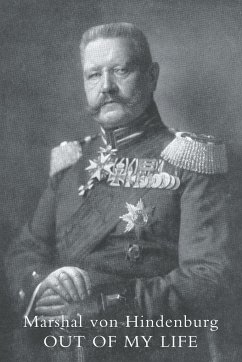This is the autobiography of Paul Ludwig Hans Anton von Beneckendorf und von Hindenburg, to give him his full name, who was born on 2 October 1847 in Posen in what was then East Prussia. He was commissioned into the 3rd Regiment of Foot Guards on 7 April 1865. He first saw action in the Austro-Prussian War of 1866 (the Seven Weeks' War) and fought at Konnigratz (Sadowa), the battle that decided that Prussia and not Austro-Hungary would be the dominant power in central Europe. . He fought in the Franco-Prussian War of 1870/71 which saw the birth of the German Empire with the King of Prussia, Wilhelm I, as Emperor (Kaiser). In 1873 he was accepted for the prestigious War Academy (Kriegsakademia) and in 1878 had his first posting to the General Staff and was promoted captain. In 1893 he was given command of the 91st (Oldenburg) Infantry Regiment, and three years later he was appointed Chief of Staff of 8th Army Corps in Coblenz. In 1900 he was promoted to command of the 28th Division at Karlsruhe and finally, in 1905, again on promotion, to command of the 4th Army Corps at Magdeburg. In 1911 he retired. Towards the end of August 1914 the German army on the Eastern Front suffered a reverse at Gumbinnen and Hindenburg was called out of retirement, promoted Colonel-General and given command on the Eastern Front, replacing von Prittwitz. Erich Ludendorff was brought over from the Western Front and appointed his chief of staff, thus began the partnership that was to last till the last weeks of the war when Ludendorff suffered a breakdown and was replaced by von Groener.This autobiography tells Hindenburg's life story from his earliest days to the Kaiser's abdication in November 1918 and the Armistice. He doesn't have an unkind word to say about any of his colleagues or superiors - they were all splendid chaps. As for his attitude to the Kaiser, suffice to say he regarded him as next to the Almighty; loyalty and devotion were the keywords. Expressions such as "my Kaiser, King and Master" and "my All-Highest War Lord" abound." His pride and belief in his country and in his duty to it come through most clearly. At the end there are no regrets, just a resounding rallying call to the "once proud and mighty German army" and belief in the "justice of our Cause and my confidence in our Fatherland and the Army." Germany will rise again is the message.
Hinweis: Dieser Artikel kann nur an eine deutsche Lieferadresse ausgeliefert werden.
Hinweis: Dieser Artikel kann nur an eine deutsche Lieferadresse ausgeliefert werden.








